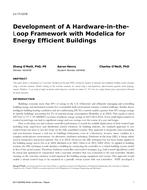Click here to purchase
The heating ventilation and air-conditioning (HVAC) system is a major contributor to building energy consumption. This paper aims to quantify the nationwide energy savings potential of implementing occupancy-based control (OBC) for HVAC systems in typical medium-sized office buildings using the EnergyPlus whole building simulation program. First, the medium-sized office from the DOE Commercial Prototype Building Models was modified to have detailed layout and space functions. Then, a statistical-algorithm-based tool was used to generate dynamic occupancy schedules for various rooms. Next, both a baseline case and two OBC cases were created for the comparison based on ASHRAE Standard 90.1-2016 and ASHRAE Guideline 36. The HVAC operation in the baseline case follows a static occupancy schedule and fixed setpoint schedules for both room air temperatures and minimum outdoor air flowrates, while the proposed OBC cases use room temperature reset, minimum outdoor airflow reset, and zone minimum supply airflow rate reset. These cases were applied to five climate zones in the United States to further quantify the energy savings potential associated with the OBC on a nationwide scale. This case study shows that there is significant energy savings potential from the proposed OBC strategies in medium-sized office buildings in the United States.
Citation: 2020 Winter Conference, Orlando, FL Conference Papers
Product Details
- Published:
- 2020
- Number of Pages:
- 9
- Units of Measure:
- Dual
- File Size:
- 1 file , 2.9 MB
- Product Code(s):
- D-OR-20-C032


